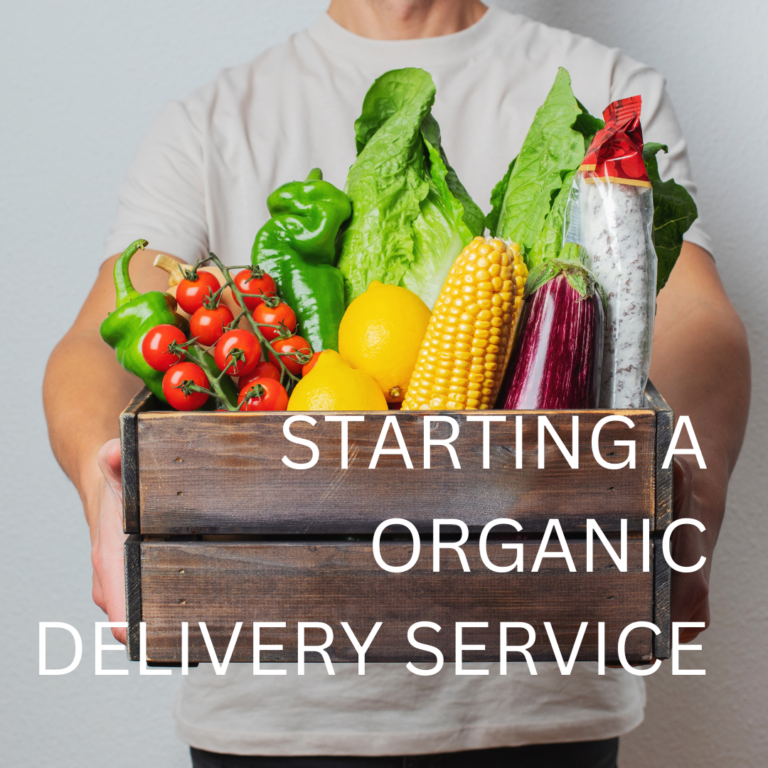In a world increasingly focused on sustainability and healthy living, the demand for organic and locally sourced food has skyrocketed. People are prioritizing fresh, chemical-free, and environmentally friendly produce over mass-produced and processed options. This shift in consumer preference presents a lucrative business opportunity: starting a local organic delivery service that brings curated boxes of fresh, local organic foods directly to households. Here, we’ll explore this business idea in-depth, discussing its benefits, implementation strategies, and why it’s a winning venture.
The Concept of a Local Organic Delivery Service
A local organic delivery service involves sourcing fresh, organic produce from local farmers and assembling it into curated boxes for delivery. Customers can subscribe to weekly or bi-weekly deliveries, enjoying fresh fruits, vegetables, dairy, eggs, meat, and other locally produced organic goods without leaving their homes. This business model not only promotes healthy eating but also supports local farmers and reduces the carbon footprint associated with transporting food over long distances.
Why This Business Idea Works
- Growing Demand for Organic Food
- The global organic food market is expected to grow significantly in the coming years, driven by increasing health awareness.
- Consumers are willing to pay a premium for organic produce that is fresher, safer, and more nutritious.
- Convenience is Key
- Busy households often struggle to find time to visit farmers’ markets or specialty stores. A delivery service brings the market to their doorstep, saving time and effort.
- Supporting Local Farmers
- By partnering with local organic farmers, this business creates a mutually beneficial relationship. Farmers get a consistent customer base, and the delivery service gets access to high-quality, fresh produce.
- Eco-Friendly and Sustainable
- Sourcing locally reduces the environmental impact of food transportation.
- Using biodegradable or reusable packaging aligns the service with eco-conscious consumer values.
- Recurring Revenue Model
- Subscription-based services provide a steady and predictable income stream.
Setting Up the Business
1. Research the Market
- Identify your target audience: health-conscious families, working professionals, or eco-conscious individuals.
- Research local competitors to find gaps in the market, such as specific products or delivery methods they don’t offer.
2. Build Relationships with Local Farmers
- Partner with certified organic farmers to ensure the quality of the produce.
- Negotiate bulk purchase agreements for a consistent supply of fresh goods.
3. Create Product Offerings
- Curate different box sizes to suit various household needs (e.g., small for singles, large for families).
- Include seasonal produce to keep offerings fresh and exciting.
- Offer add-ons such as organic jams, honey, bread, or ready-made meals from local suppliers.
4. Develop a Brand Identity
- Create a name and logo that reflect your commitment to health, sustainability, and community.
- Build a professional website with a user-friendly interface for subscriptions and payments.
- Use social media to showcase your products, share recipes, and connect with your audience.
5. Invest in Logistics
- Ensure efficient delivery by mapping routes to minimize time and fuel usage.
- Use eco-friendly delivery vehicles, such as electric vans or bicycles, to enhance your sustainability appeal.
- Invest in high-quality packaging that keeps produce fresh while being environmentally responsible.
6. Marketing and Customer Acquisition
- Leverage local advertising channels such as community newsletters, farmers’ markets, and local radio.
- Partner with local influencers or bloggers to promote your service.
- Offer incentives such as discounts for first-time customers or referral bonuses for existing clients.
7. Create a Subscription Model
- Offer flexible subscription plans: weekly, bi-weekly, or monthly.
- Allow customization so customers can select preferred items or exclude certain products.
- Implement a loyalty program to retain long-term customers.
Benefits for Customers
- Healthier Lifestyles
- Access to fresh, organic produce encourages healthier eating habits.
- Customers can feel confident knowing their food is free from harmful chemicals and pesticides.
- Convenience
- A delivery service saves time and eliminates the hassle of grocery shopping.
- Support for Local Economy
- Customers contribute to the local economy by supporting nearby farmers and producers.
- Environmental Impact
- Purchasing locally reduces the carbon footprint of food transportation and supports sustainable farming practices.
Challenges and Solutions
- Maintaining Freshness
- Challenge: Ensuring produce stays fresh during transport.
- Solution: Use insulated or temperature-controlled packaging and prioritize short delivery times.
- Balancing Supply and Demand
- Challenge: Matching the availability of produce with customer orders.
- Solution: Work closely with farmers to forecast demand and plan accordingly.
- Managing Logistics
- Challenge: Delivering to multiple locations efficiently.
- Solution: Optimize delivery routes with software and consider using local hubs for distribution.
- Pricing Competitively
- Challenge: Balancing affordability for customers with fair prices for farmers.
- Solution: Highlight the value of organic, local produce and consider tiered pricing for different box sizes.
Why This Business Idea Is Future-Proof
- Sustainability Trend
- The shift towards eco-friendly and sustainable living is not a passing trend. As consumers become more environmentally conscious, businesses that prioritize sustainability will thrive.
- Health Awareness
- Post-pandemic, health and wellness have become top priorities for many households. Organic food delivery aligns perfectly with this growing focus.
- Tech Integration
- Advances in technology, such as apps for order tracking and route optimization, make this business more efficient and scalable.
- Community Connection
- Local delivery services foster a sense of community, building trust and loyalty among customers.
Conclusion
Starting a local organic delivery service is more than just a business; it’s a way to contribute positively to the community and environment. By providing fresh, healthy, and locally sourced food directly to households, you’re meeting a growing demand while supporting local farmers and promoting sustainable practices. With careful planning, strong farmer partnerships, and a focus on customer satisfaction, this business has the potential to be highly profitable and impactful.
Now is the perfect time to tap into the organic food market and make a difference in your community. Whether you’re passionate about healthy eating, sustainability, or supporting local businesses, this venture offers a unique opportunity to combine purpose with profit.



